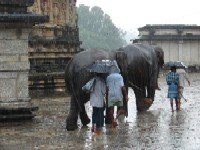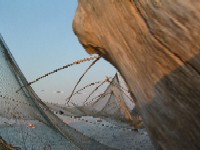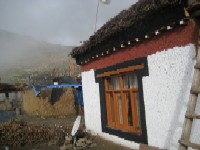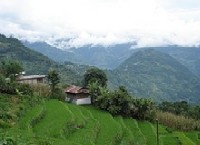The following is my comment on Catherine Mack's article on certification:
"When responsibility comes from within, whether someone is certified or not doesn't make a difference. However unfortunately that's not how majority of the industry functions. To what extend can reporting back from travellers bring in a control on green-washers? To what extend can tourist actually see the entire supply chain and report back? To what extend would a traveller run around and report back on the green credentials of operators / properties, rather than enjoying their holidays?...
In 5 years of running our company, we have come across many DMC's in India who are many times transparent and accountable than any that has been certified by someone like Green Globe. To do a fantastic job, they don't need certification, however this doesn't mean that any one of these people might be unwilling to respond to questions from those who are interested in the responsibility factor of their business.
We know personally many stories of poorest of poor artisans in the state of Rajasthan who are cheated by so-called fair trade organisations funded by many international organisations. It's not about taking massive amount of margins. (A leather bag bought at 7 Euro sold at 110 Euro in Habitat isn't our concern.)But, to pay these poor artisans, below standard rates to mass produce these bags and then call it fair-trade is the crime. When we ask the illiterate artisan(sitting in front of a big poster announcing the fair-trade practices of his partners (meaning organised buyers in Europe and their whole sale agents in India))what he understands by "fair trade", he says, he gets about 20 GBP per year to send his kids to school ! For me, that is scandal and not fair trade!
When you see a stamp of fair-trade on a product that one purchases in the west, people buy those (to an extend) as a guilt free experience. 'My purchase is making a difference to the destination from where this product came from. I know that this product I buy hasn't been sourced through exploitation'. Oxfam fair trade coffee became a hit earlier mainly because of this. However, as in the case of a traveller, who might want to know more of about the responsibility factor of the supply chain on which the holiday is running, the lay customer who quickly runs into a fair-trade shop doesn't have or resources or energy to investigate the 'fairness' of these products.
I am not suggesting that we need to have another organisation that certify the 'fairness' of the organisation that has already certified these products. Though that will be a hilarious situation.
What is missing in all the certification process is the matter of 'Trust'. Our guests purchase many souvenirs from the artisans we work with mainly in Kerala and Rajasthan. They buy leather products, bell metal art, pottery and puppets without any question of 'certification'. None of these are certified products in any case!
The reason they purchase these with genuine interest is because of the 'trust' they have developed with the company they are travelling with, and most importantly because they are purchasing it straight from the hand of the artisan without a middle-man. ( certified or not!).
I don't know how this 'trust' factor can be built in the purchase when you buy it from elsewhere. (For.eg, a purchase in a shop in London claiming to have fair practices)
However one way to sort out of these issue of trust / certification is for the operators ( Tour, or property owners) to be pro-active about their claims. Orchid Ecotel in Mumbai for e.g, are so proud to show their guests on check-in about the responsibility in which they are running their business! This touch and feel experiences makes all the difference.
"When responsibility comes from within, whether someone is certified or not doesn't make a difference. However unfortunately that's not how majority of the industry functions. To what extend can reporting back from travellers bring in a control on green-washers? To what extend can tourist actually see the entire supply chain and report back? To what extend would a traveller run around and report back on the green credentials of operators / properties, rather than enjoying their holidays?...
In 5 years of running our company, we have come across many DMC's in India who are many times transparent and accountable than any that has been certified by someone like Green Globe. To do a fantastic job, they don't need certification, however this doesn't mean that any one of these people might be unwilling to respond to questions from those who are interested in the responsibility factor of their business.
We know personally many stories of poorest of poor artisans in the state of Rajasthan who are cheated by so-called fair trade organisations funded by many international organisations. It's not about taking massive amount of margins. (A leather bag bought at 7 Euro sold at 110 Euro in Habitat isn't our concern.)But, to pay these poor artisans, below standard rates to mass produce these bags and then call it fair-trade is the crime. When we ask the illiterate artisan(sitting in front of a big poster announcing the fair-trade practices of his partners (meaning organised buyers in Europe and their whole sale agents in India))what he understands by "fair trade", he says, he gets about 20 GBP per year to send his kids to school ! For me, that is scandal and not fair trade!
When you see a stamp of fair-trade on a product that one purchases in the west, people buy those (to an extend) as a guilt free experience. 'My purchase is making a difference to the destination from where this product came from. I know that this product I buy hasn't been sourced through exploitation'. Oxfam fair trade coffee became a hit earlier mainly because of this. However, as in the case of a traveller, who might want to know more of about the responsibility factor of the supply chain on which the holiday is running, the lay customer who quickly runs into a fair-trade shop doesn't have or resources or energy to investigate the 'fairness' of these products.
I am not suggesting that we need to have another organisation that certify the 'fairness' of the organisation that has already certified these products. Though that will be a hilarious situation.
What is missing in all the certification process is the matter of 'Trust'. Our guests purchase many souvenirs from the artisans we work with mainly in Kerala and Rajasthan. They buy leather products, bell metal art, pottery and puppets without any question of 'certification'. None of these are certified products in any case!
The reason they purchase these with genuine interest is because of the 'trust' they have developed with the company they are travelling with, and most importantly because they are purchasing it straight from the hand of the artisan without a middle-man. ( certified or not!).
I don't know how this 'trust' factor can be built in the purchase when you buy it from elsewhere. (For.eg, a purchase in a shop in London claiming to have fair practices)
However one way to sort out of these issue of trust / certification is for the operators ( Tour, or property owners) to be pro-active about their claims. Orchid Ecotel in Mumbai for e.g, are so proud to show their guests on check-in about the responsibility in which they are running their business! This touch and feel experiences makes all the difference.
Labels: Certification, Fair trade, Kerala, Rajasthan, Responsible holidays
 TBY featured twice among '500 new ways to see the world'
TBY featured twice among '500 new ways to see the world'
0 Comments
Published by GP
on Tuesday, 16 June 2009

Cover page: edited by Jeremy Smith and Richard Hammond
Discusses 500 experiences and different ways to travel. This book lets you discover various adventures from sleeping in houseboats in Kerala and witnessing the zebra migration in Botswana to taking the train-hotel from Paris to Madrid. It offers information on the best hotels, resorts, and tours run by people who are passionate about what they do.

Pic: Kerala scenes, Kathakali performance, practicsing Kalaripayattu, peppercones growing in the sun
The following excerpts are from the book
" To really discover the heart of Kerala, you need to leave the beach, jump off the houseboat or troop down from the hills to the banks of the River Nila, where a variety of traditional activities are on offer with The Blue Yonder...."

"The Blue Yonder take guest to see people who make dolls like this"
"The largest state in India, Rajasthan is also one of the most beautiful and exciting - home to colourful markets, welcoming cities, vibrant music and delicious cuisine. The royal palaces that pepper the state feature heavily on tourist itineraries, rich , decorative and intricate, they epitomize the luxury and decadenance of the Raj. But for those who want to go behind the scenes, India-based travel company The Blue Yonder runs custom-made trips that allow you to explore what really makes Rajasthan tick. "
Labels: Foot Print Guide books, Jeremy Smith, Kerala, Media, Rajasthan, Responsible Tourism, Responsible Travel, Richard Hammond, River Nila, The Blue Yonder
TBY launch in Jaipur. Pic courtesy John Dean
We have been interacting with an American Travel operator to explore the option of working with The Blue Yonder in Rajasthan. On a visit to see our work with the communities in Jaipur, they were keen on knowing how much money was going to the communities, to the local organisations we work with, to The Blue Yonder and how we maintain the transparency in financial dealings etc. Positioning their company as a Responsible Travel company means that they were also accountable for the 'claims' of potential partners like us. Their clients will be keen on knowing how their contribution would make a difference.
Providing dignity is key while working with communities. Pic courtesey John Dean
Since most of our destination management experiences came from what we learnt from River Nila in Kerala, we take our activity partners in other destinations to understand where we come from. It's amazing to see how people from different culture ( within India) look at these initiatives in different way. Local dynamics are so different with the communities we work with in different parts of India. In some places, people continue to work with art and crafts, because they have the passion and drive to do it, but in some other places, they do it because that's all they know as a livelihood and without art they are in utter poverty.
In our journey through Rajasthan, this was something that stood up most of the time. Any tourist hotel in Rajasthan would have an evening performance. There will be artists dancing and singing and there will be tourists sitting and sipping their beers without knowing anything about the background of the artists or why they are there! For most international tourists, this is in any case something quite exotic.
Most of these artists are hired by contractors who 'outsource' them to different hotels in the cities and are paid pittance once in a month. There is absolutely no element of dignity in their work and they perform for the sake of bread-winning. They mostly just dance around, sans any energy, any passion and I don't think any one can blame them if you don't even see a sincere smile on their face. How do you smile when you are not happy? When your constant worry is about next days meal, where will that genuine smile come from?
One of our artist friend from Rajasthan after his tour of Kerala mentioned the other day, "You guys can talk about reviving art forms and tradition. That's nice. But many of the guys you work with in Kerala are grounded properly and have their livelihood. They have a basic comfort zone to explore further. In our case, we are struggling to earn our living and still want to pursue our traditional arts. We wonder how we can strike a balance between these two worlds".
Pic courtesey John Dean
When I shared our Rajasthani friends observation on Kerala artists being well off to one of our artists in Kerala, he said, "Yeah, we are good in faking. Good that our friend didnt see what is really happening behind the fancy clothes we wear and the decent looking houses we have"! There is not single day that I go to bed wondering how we will get through this month with mounting expenses in my day to day life!"
Bangalore © GP 2008
Labels: Communities, Jaipur, Rajasthan, Responsible Tourism, The Blue Yonder






























